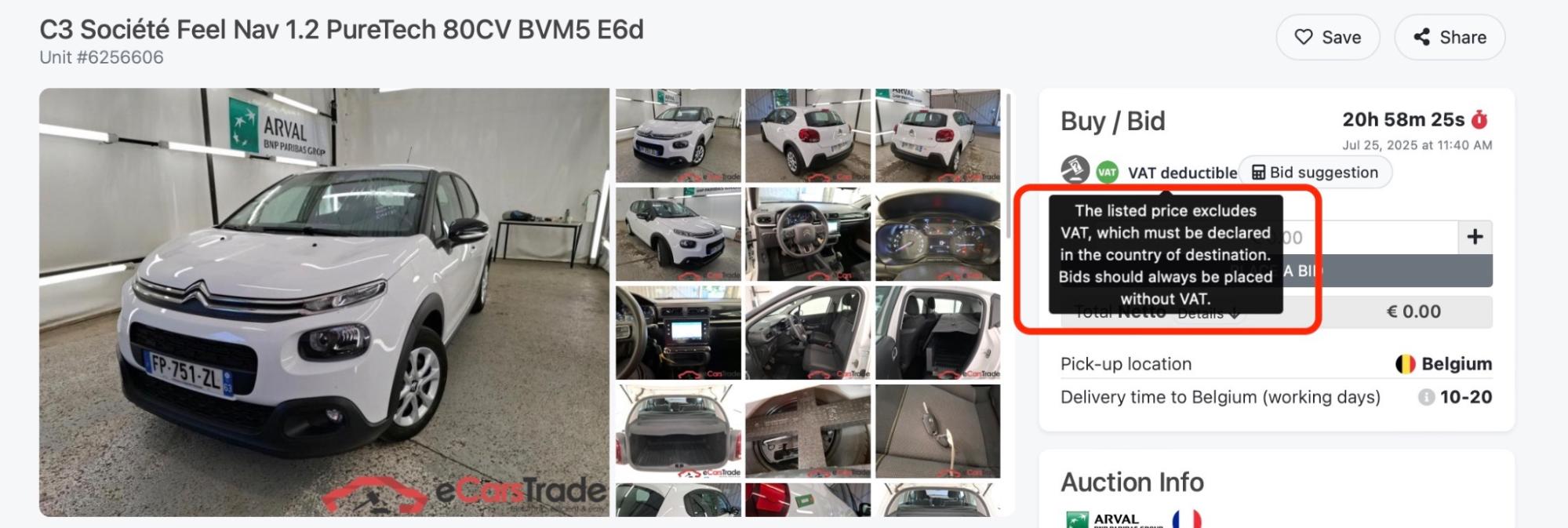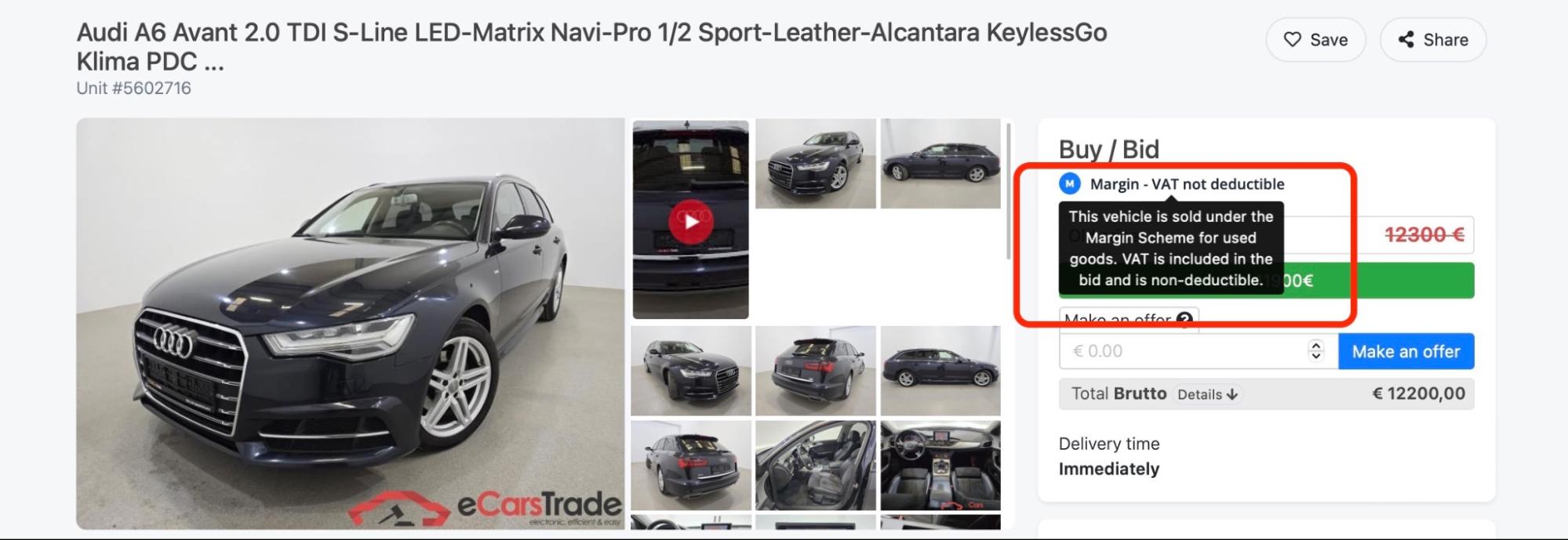- Blog
- Porezi na automobile u Poljskoj - Vodič za prodavače automobila
Porezi na automobile u Poljskoj - Vodič za trgovce automobilima
Saznajte koje poreze na automobile morate platiti u Poljskoj prilikom kupnje, prodaje ili uvoza rabljenih vozila i pogledajte koje su poticaje za električna vozila dostupne u 2025. godini.

Ključni podaci
- Glavni porezi na automobile s kojima ćete se susresti su PDV, trošarina i registracijske pristojbe .
- PDV se primjenjuje na većinu prodaje automobila po standardnoj stopi od 23% , a trgovci ga obično mogu povratiti ako je prikazan na računu.
- Porez PCC ne primjenjuje se na trgovce registrirane za PDV, primjenjuje se samo u transakcijama između privatnih osoba.
- Električna vozila dolaze s nekoliko poreznih pogodnosti , uključujući oslobađanje od trošarina ili poreza na registraciju, puni odbitak PDV-a za tvrtke i subvencije za privatne kupce.
Bez obzira uvozite li automobile u Poljsku ili prodajete vozila lokalno, važno je razumjeti kako funkcioniraju porezi.
Poznavanje vremena i broja plaćanja pomaže vam da točno izračunate troškove i izbjegnete iznenađenja. Također, poznavanje svih poreza koje ćete morati platiti pomaže vam da odredite cijenu automobila koje prodajete na način koji će vašem salonu osigurati profitabilnost.
U ovom vodiču proći ćemo kroz glavne poreze na vozila u Poljskoj, nedavne promjene u 2025. godini i što one znače za trgovce rabljenim automobilima, kako biste mogli bolje planirati i pametnije prodavati.
Popis svih poreza na vozila u Poljskoj
Pogledajmo kakve poreze na automobile ima u Poljskoj.
#1 PDV - Porez na dodanu vrijednost
Standardna stopa PDV-a u Poljskoj iznosi 23% . Kada prodavač registriran za PDV kupuje ili prodaje automobil, obračun PDV-a ovisi o vrsti računa: bez PDV-a ili s maržom.
U većini slučajeva, automobili se prodaju bez PDV-a. To znači da prodavatelj ne naplaćuje PDV na računu, a kupac (na primjer, poljski trgovac) mora prijaviti i platiti PDV u svojoj zemlji.
Na primjer, ovaj automobil na eCarsTradeu je naveden kao automobil bez PDV-a , pa kupac prijavljuje i plaća PDV u svojoj zemlji .

Ali u nekim slučajevima, automobili se prodaju prema shemama marže . U tom slučaju, PDV je već plaćen u zemlji podrijetla.
Popisi eCarsTrade-a s PDV-om na marži izgledaju ovako:

Prodavatelj ne plaća PDV pri uvozu i ne može ga kasnije odbiti. Prilikom preprodaje automobila, PDV se obračunava samo na trgovčevu profitnu maržu (ne na punu cijenu) i ne prikazuje se zasebno na računu.
#2 Trošarina (Akcyza)
Ako uvozite vozilo u Poljsku, čak i iz druge zemlje EU, morate platiti trošarinu .
Količina ovisi o veličini motora i o tome je li automobil hibridni, električni ili s motorom s unutarnjim izgaranjem (ICE) .
Na primjer, ako dovezete benzinski automobil s motorom manjim od 2000 cm³, platit ćete stopu od 3,1%. Ali ako motor ima veći od 2000 cm³, stopa raste na 18,6%.
Hibridni automobili imaju snižene stope, kao što možete vidjeti u ovom pregledu stopa.

Potpuno električna vozila trenutno su oslobođena plaćanja trošarine .
#3 PCC porez (Porez na transakcije u građanskom pravu - obrazac PCC-3)
Trgovci automobilima registrirani za PDV ne moraju plaćati PCC porez, ali ga je ipak vrijedno spomenuti. Ovaj se porez uglavnom primjenjuje na prodaju između privatnih vozila i obično iznosi 1% ili 2% tržišne vrijednosti vozila.
#4 Naknada za registraciju (Opłata rejestracyjna)
Registracija vozila u Poljskoj uključuje nekoliko manjih administrativnih pristojbi. To uključuje naknade za registarske pločice, potvrdu o registraciji i naljepnicu za tehnički pregled . Ukupni trošak obično iznosi oko 180 PLN.
Potpuno električna vozila su oslobođena poreza na registraciju .
Sada, pogledajmo kako se ovi porezi međusobno uspoređuju.
Vrsta poreza | Odnosi se na | Stopa ili iznos | Kada platiti |
PDV | Većina prodaje automobila | 23% | Na rasprodaji |
Trošarina | Uvezeni automobili | 18,6% / 3% za motor s unutarnjim izgaranjem, varira za ostale vrste goriva | Prilikom registracije |
Porez na PCC | Privatna prodaja | 1% ili 2% | U roku od 14 dana od transakcije |
Kotizacija za registraciju | Svi registrirani automobili | ~180 PLN | Godišnje |
Možda ste primijetili da Poljska ne naplaćuje fiksnu godišnju porez na ceste. Umjesto toga, vozači i dalje doprinose financiranju cesta kroz cijenu goriva, pa tako vlada prikuplja novac za održavanje cesta i infrastrukturu.
Što je novo? Porezne i regulatorne promjene u 2025. godini
2025. nije donijela drastične promjene u pogledu poreza na automobile. Ipak, imajte na umu da je 2025. bilo nekih reformi trošarina .
Onaj koji je najrelevantniji za trgovce automobilima je novi povrat trošarine za izvezena vozila.
Od 2025. godine, ako privremeno registrirate automobil u Poljskoj, platite trošarinu na njega, a zatim ga izvezete (na primjer u drugu zemlju EU), možete podnijeti zahtjev za povrat te trošarine. To znači lakšu trgovinu preko granica.
Porezni scenariji za kupnju i prodaju rabljenih automobila u Poljskoj
Spremni ste vidjeti kako ovi porezi funkcioniraju u praksi? Evo pregleda najčešćih scenarija.
► Slučaj 1: Prodaja rabljenog automobila
Ako ste prodavač automobila registriran za PDV i prodajete rabljeni automobil u Poljskoj , glavni porezi su:
- PDV, koji uključujete u račun (23% vrijednosti).
- Porez na PCC se ne primjenjuje, budući da su trgovci koji prodaju automobile s PDV-om oslobođeni. PCC je samo za privatne transakcije.
- Nema trošarine, jer je automobil već registriran u Poljskoj.
- Kupac plaća registracijske troškove, a ne prodavatelj.
Električna vozila : Jedina je razlika u tome što su električna vozila oslobođena trošarine, ali ako se automobil već nalazi u Poljskoj, to oslobođenje je već primijenjeno, tako da se ne morate brinuti o tome.
► Slučaj 2: Kupnja rabljenog automobila
Ako ste prodavač koji kupuje rabljeni automobil od poljskog prodavača :
- Ako je prodavatelj tvrtka, vjerojatno ćete dobiti račun s mogućnošću odbitka PDV-a i kasnije ćete moći zatražiti povrat PDV-a.
- Ako kupujete od privatne osobe, nećete dobiti račun s PDV-om i ne možete zatražiti povrat PDV-a.
- Ne plaća se trošarina ako se automobil već nalazi u Poljskoj.
- Porez na PCC ne primjenjuje se na trgovce koji kupuju za preprodaju s odgovarajućim računom.
Električna vozila : Električna vozila tretiraju se kao i svi ostali automobili i već su oslobođena trošarine ako su već registrirana u Poljskoj.
► Slučaj 3: Uvoz rabljenog automobila iz EU (npr. Njemačke)
Recimo da kupite rabljeni automobil iz Njemačke putem platforme poput eCarsTrade . Evo što se događa:
- Njemački prodavatelj obično neće naplatiti PDV ako su obje strane registrirane za PDV.
- U Poljskoj prijavljujete 23% PDV-a, ali budući da preprodajete automobil, obično ga možete odbiti, pa se on poništava u vašoj PDV prijavi.
- U Poljskoj plaćate trošarinu na temelju veličine motora i vrste goriva (osim ako automobil nije potpuno električni).
- Također plaćate standardnu registracijsku pristojbu (oko 180 PLN) prilikom registracije automobila.
- Ne primjenjuje se PCC porez ako kupujete s poslovnim računom i automobil postane dio vašeg inventara.
► Slučaj 4: Uvoz rabljenog automobila iz zemlje izvan EU (npr. SAD-a)
Ako uvozite automobil iz zemlje izvan EU , evo što trebate platiti:
- PDV od 23%, izračunat na punu carinsku vrijednost (auto + dostava + carina).
- Carina, obično 10% vrijednosti vozila.
- Trošarina, na temelju veličine motora i vrste goriva.
- Naknade za registraciju u Poljskoj.
- Nema PCC poreza, sve dok se radi o poslovnom uvozu s odgovarajućom dokumentacijom.
Električna vozila : Potpuno električna vozila oslobođena su trošarine, ali se PDV i carina i dalje primjenjuju.
Električna vozila u Poljskoj: Porezne olakšice
Potpuni pregled poreznih poticaja možete pronaći na web stranici Europskog opservatorija za alternativna goriva , ali evo kratkog pregleda ključnih prednosti.
Kao što ste vidjeli gore, Poljska podržava prodaju električnih vozila oslobađajući ih od trošarine . Osim toga, potpuno električna vozila također su oslobođena poreza na registraciju .
Nadalje, tvrtke koje koriste električna vozila za poslovanje mogu odbiti puni PDV od 23% i imati koristi od viših ograničenja amortizacije, što je izvrsno za vozne parkove i poslovne kupce koji žele smanjiti svoje poreze.
Vlada je također uvela subvencije za kupce električnih vozila . Kroz program NaszEauto za 2025. godinu, kupci koji ispunjavaju uvjete mogu dobiti do 40.000 PLN (9.500 €) kako bi pokrili troškove novog električnog automobila.
Iako se ovo ne odnosi izravno na trgovce, to je definitivno dobra prodajna prednost prilikom ponude električnih vozila kupcima.

Često postavljana pitanja
► Koliko košta registracija automobila u Poljskoj?
Registracija automobila u Poljskoj obično košta oko 180–250 PLN. To uključuje registarske pločice, potvrdu o registraciji i naljepnicu za tehnički pregled. Ako odaberete prilagođene pločice, ukupan iznos bit će veći.
► Temelje li se porezi na automobile u Poljskoj na emisijama CO2?
Trenutno je samo trošarina donekle povezana s emisijama. Ne temelji se izravno na CO₂-u, već ovisi o veličini motora i vrsti goriva, pa se automobili s većim motorima (koji obično emitiraju više) oporezuju više. U Poljskoj trenutno ne postoji zaseban porez na automobile temeljen na CO₂-u.
► Jesu li prodavači automobila obvezni platiti porez na PCC?
Ne, prodavači automobila registrirani za PDV koji kupuju i prodaju automobile kao dio svog poslovanja ne plaćaju PCC porez. Obrazac PCC-3 uglavnom se koristi za privatne transakcije.
► Kada se plaća porez na promet automobila u Poljskoj?
U Poljskoj ne postoji zaseban porez na promet automobila za tvrtke. PDV se plaća kao dio vaše PDV prijave, a trošarina se plaća u trenutku registracije za uvezena vozila.
Uvoz vozila iz Europe može biti složen, ali eCarsTrade je tu da pojednostavi proces. Naučite kako:

